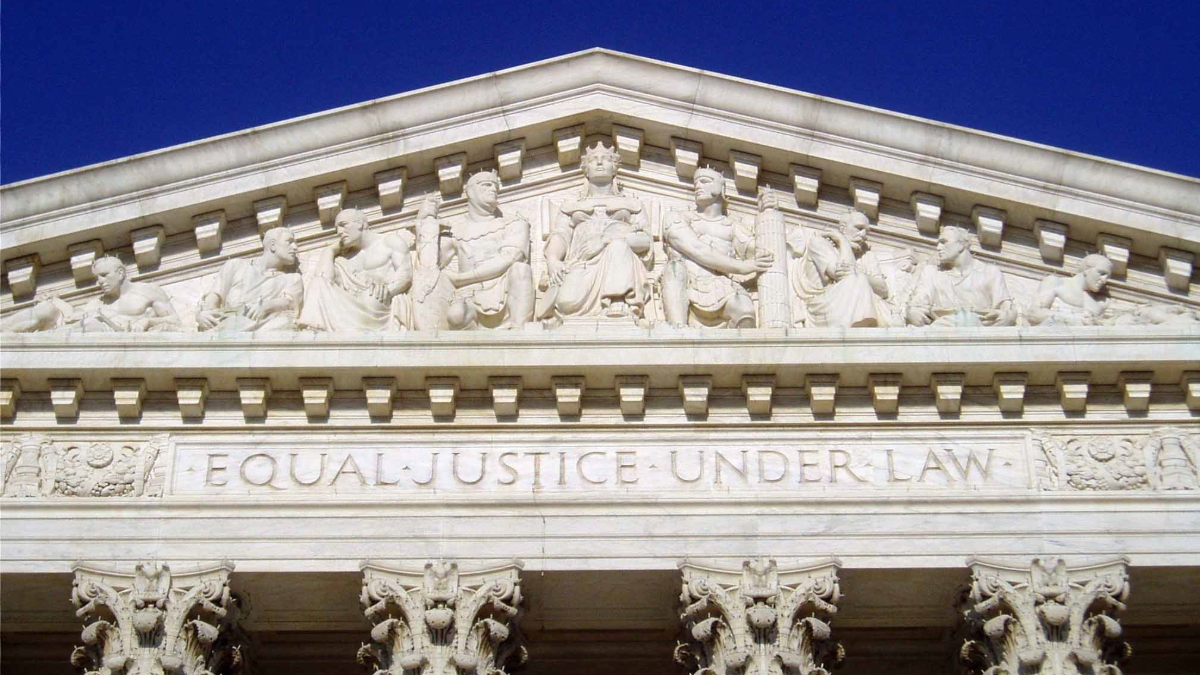The Supreme Court is Set to Protect the Fed but Abandon the FTC
Chris Lewis / Oct 28, 2025Chris Lewis is the President and CEO of Public Knowledge.

The inscription Equal Justice Under Law as seen on the frieze of the United States Supreme Court building in Washington DC. Matt Wade/Wikimedia CC BY-SA 3.0
The Supreme Court’s recent handling of cases involving the Federal Trade Commission (FTC) and the Federal Reserve Board has profound implications for the independence of both regulatory agencies. While the Court’s decision to protect the Federal Reserve’s autonomy might appear to uphold institutional integrity, its refusal to do the same to safeguard the FTC’s independence marks a dangerous precedent. The independence Congress intended, designed to depoliticize expert regulation to protect competition and consumers, is now in jeopardy.
With these decisions, the Court has now signaled its intent to serve as an illegitimate policymaker. The Court’s decision to allow Federal Reserve Board Governor Lisa Cook to temporarily maintain her post demonstrates that the Court is willing to twist itself into a pretzel to appease President Trump. The Court is poised to either ignore its own precedents or make up new legal theories to justify giving the executive branch the unconstitutional levels of power it wants — except, apparently, when it comes to the Fed. What’s going on?
The president has attempted to fire two commissioners from the Federal Trade Commission, an independent agency vital for regulating the technology sector. While one commissioner eventually resigned during this legal process, the other – Rebecca Kelly Slaughter – was terminated by the executive branch. Meanwhile, President Trump turned his attention to a different independent agency, firing Governor Lisa Cook from the Federal Reserve Board. Both officials sued and won reinstatement, but when the matter eventually reached the Supreme Court’s desk, the outcomes were absurdly different: The Court allowed Ms. Cook to keep her job while litigation continues, yet refused to allow Ms. Slaughter to do the same.
This contrast should alarm anyone who values the rule of law and independent oversight. The message is clear. The Supreme Court will protect the Federal Reserve Board’s independence, but the FTC, along with every other independent agency, is apparently fair game for political interference. Why is the Supreme Court only respecting the Federal Reserve Board’s independence, when Congress established all independent agencies to be shielded from political tampering?
Congress created independent agencies precisely to insulate certain functions from presidential whims. Agencies like the FTC and the Federal Reserve Board make decisions that require expertise, consistency, and freedom from short-term political pressure. That’s why Congress created independent commissions with bipartisan members, confirmed by the Senate, who serve fixed terms and can only be removed “for cause,” meaning misconduct or neglect of duty – not policy disagreements.
This has been settled law since 1935, when the Supreme Court upheld FTC independence in Humphrey’s Executor v. United States. In that case, the Court upheld statutory protections for FTC commissioners against presidential removal. Yet Rebecca Kelly Slaughter was fired without cause in direct violation of both statute and precedent. Lisa Cook’s firing at least came with an attempt at a veneer of legality. The White House has been paying attention to signals from the Supreme Court suggesting the Federal Reserve Board will be treated differently. Those clues told the administration it needed at least a pretense of legal justification for removing a board governor.
A doctrine called the “unitary executive” theory claims that because the Constitution makes the president the head of the executive branch, anyone under the president in the federal government can be fired at will. The Supreme Court has shown increasing sympathy for this view, but notice the contradiction. The Constitution directs the president to ensure that “the laws be faithfully executed.” What kind of executive power allows the president to ignore laws passed by Congress, when the president is supposed to be carrying them out? If faithfully carrying out the law means the president can disregard the law at will, then “executive power” has been turned on its head.
Nevertheless, if the “unitary executive” theory is to be the law of the land, why did the Supreme Court treat these agencies differently? The Court has left hints. In 2020, the Federal Reserve Board argued that it “can claim a special historical status,” and in 2024, Justice Alito asserted that the Federal Reserve Board “is a unique institution with a unique historical background.” And yet, both independent agencies carry virtually identical structures. In fact, you could argue that the Court’s “historical status” exception could just as easily be applied to the FTC, which has existed since 1914. (Left unsaid here is why a “historical status” should create an exception to the Constitution in the first place.)
Both agencies also matter enormously to the economy. The Federal Reserve Board controls monetary policy, regulates banks, and sets interest rates. Its independence is widely viewed as crucial to economic stability and inflation control. The FTC’s role is equally vital. It protects consumers from fraud, ensures fair competition, and enforces antitrust laws. The FTC shapes the economy from the consumer and competition side – among other things, deciding whether to challenge corporate mergers, and determining which business practices are unfair or deceptive.
The uncomfortable truth is that the Supreme Court is making policy judgments dressed up as constitutional law. The justices apparently view the Federal Reserve Board as more important to insulate from politics than the FTC. Is it because they value the stock market, which could drop as a consequence of interference, more than the American public?
Regardless, if the Supreme Court continues down this path, the FTC could permanently become a mere extension of the White House rather than an independent regulator serving the public. The agency’s efforts to regulate technology giants, enforce antitrust laws, and protect consumers will now depend on presidential approval rather than independent, expert analysis— as has also been alleged in the Department of Justice’s handling of antitrust cases this year.
The discrepancy between the Supreme Court's treatment of the Federal Reserve and the FTC is a judgment about policy priorities, not constitutional requirements. If removal protections violate the separation of powers, they violate it for both agencies. If they're constitutional, then they're constitutional for both. Congress decided that both should be independent. It's not the Court’s job, however, to decide which agency it thinks needs political insulation more urgently. The people require judicial consistency from the Supreme Court — not policymaking.
Authors
